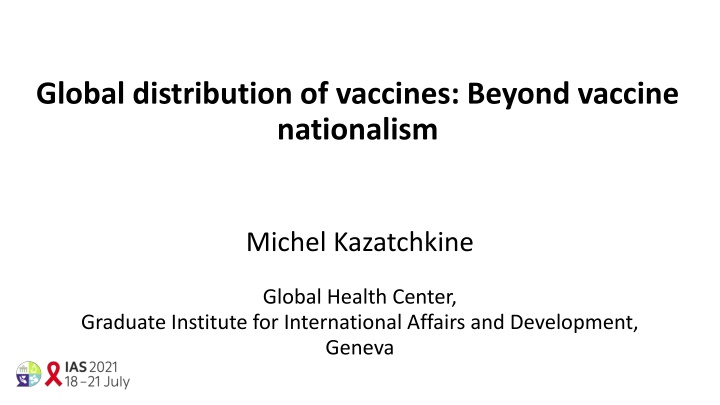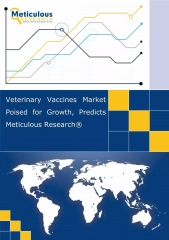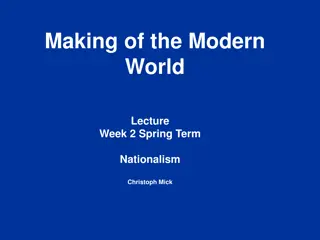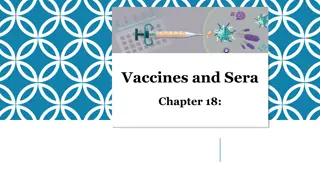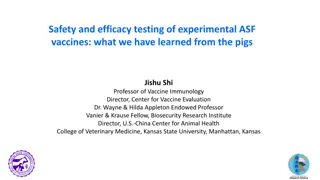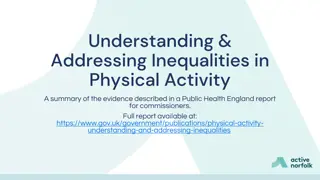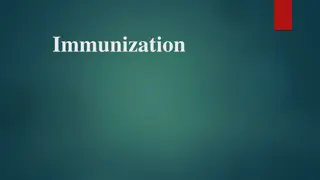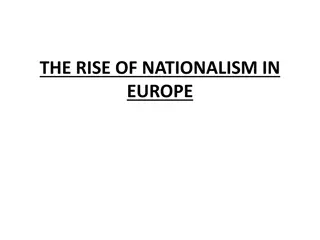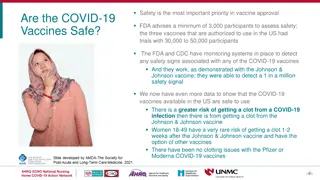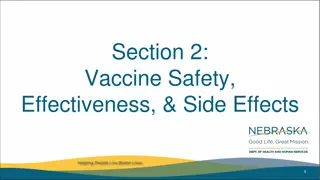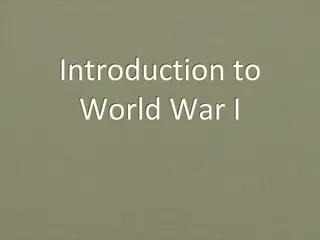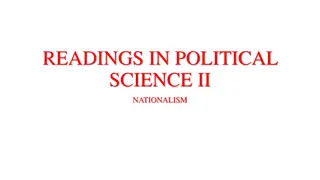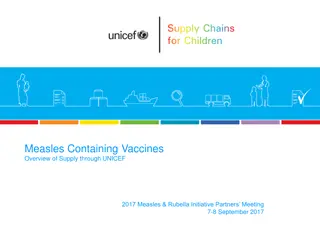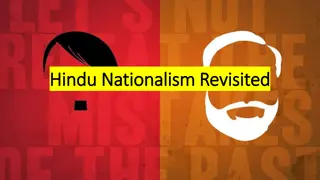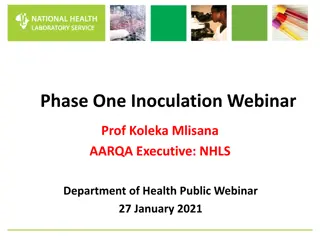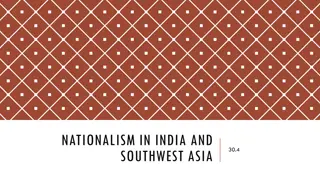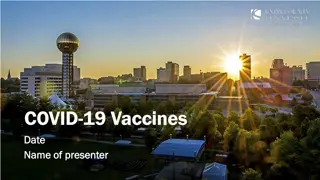Global Distribution of Vaccines: Addressing Inequalities and Nationalism
The global distribution of Covid-19 vaccines highlights stark inequalities driven by manufacturing capacity saturation, nationalism, and unequal access. Vaccine diplomacy plays a crucial role, with countries like China, Russia, and India leveraging vaccines for strategic purposes. While vaccine rivalry persists, the focus should be on saving lives and assisting those in need amid the pandemic.
Download Presentation

Please find below an Image/Link to download the presentation.
The content on the website is provided AS IS for your information and personal use only. It may not be sold, licensed, or shared on other websites without obtaining consent from the author.If you encounter any issues during the download, it is possible that the publisher has removed the file from their server.
You are allowed to download the files provided on this website for personal or commercial use, subject to the condition that they are used lawfully. All files are the property of their respective owners.
The content on the website is provided AS IS for your information and personal use only. It may not be sold, licensed, or shared on other websites without obtaining consent from the author.
E N D
Presentation Transcript
Global distribution of vaccines: Beyond vaccine nationalism Michel Kazatchkine Global Health Center, Graduate Institute for International Affairs and Development, Geneva
Covid-19 vaccines, July 2021 The development of several effective covid-19 vaccines in just a year is a testimony to the world s global scientific and technological capabilities. It shows what is possible when political will exists and (public) resources are made available. However, stark inequalities in access to these vaccines are leaving large parts of the world exposed to the risk of covid-19 with the resulting health, economic, and societal consequences. Global vaccine-induced herd immunity is unlikely to be achieved before several years, also exposing the world to the risk of emergence of new phenotypic variants selected by weak immune pressure.
Name of the Speaker Topic Lore Ipsum
Unequal access to Covid-19 vaccines These inequalities are fueled by a combination of: The current saturation of manufacturing capacity (except in China). The concentration of manufacturing capacity, of trials and knowledge generation for vaccines in only a small number of countries. Private sector control over intellectual property rights and industrial capabilities. Vaccine nationalism.
Vaccine nationalism Nationalism is a wide-ranging political concept that relates to putting the interest of a single nation first, above others, for economic or security reasons. The term has been coined in the wake of dozens of governments in high income countries scrambling to sign deals with pharmaceutical companies directly, to secure vaccines for their own populations limiting the stock available for others. HIC countries have secured 4.3 b doses for a population of 1.16b people.
Vaccine diplomacy From a public health perspective, ensuring that all countries can get rapid access to a Covid-19 vaccine is essential to getting the pandemic under control. Yet from a geopolitical perspective, drugs and vaccines for Covid-19 have become a strategic asset one that can affect a country s place in the global order, and an object of fierce competition. China, Russia and India have been making vaccines readily and cheaply available or providing them free of charge in countries with whom they want to strengthen relations, despite their own domestic needs.
Vaccine diplomacy Is it the end of the world if America, China and others compete to ensure vaccinations ? Who cares where vaccines come from or which political system they belong to if they save lives? (Lord O Neill, Chatham House). If rivalry is to prevail, it can be turned around to the advantage of those who most need assistance.
Independent Panel for Pandemic Preparedness and Response, May 2021: call for immediate action High income countries with a vaccine pipeline for adequate coverage should, alongside their scale-up, commit to provide the 92 low-and middle-income countries of Covax, at least one billion vaccine doses no later than 1 September 2021 and more than two billion doses by mid-2022. G7 and G20 countries to commit to providing the US$ 19 billion required for ACT-A in 2021 for vaccines, diagnostics, therapeutics and strengthening health systems. The WTO and WHO to convene major vaccine-producing countries and manufacturers to get agreement on voluntary licensing and technology transfer arrangements for COVID-19 vaccines. If actions do not occur within three months, a waiver of intellectual property rights under the TRIPS Agreement should come into force immediately. s
Independent Panel for Pandemic Preparedness and Response, May 2021: recommendations for mid-term Establish strong financing and regional capacities for manufacturing, regulation, and procurement of tools for equitable and effective access to vaccines, therapeutics, diagnostics and essential supplies, and for clinical trials. Ensure technology transfer and commitment to voluntary licensing are included in all agreements where public funding is invested in research and development.
Industrial policies Our failure to translate technological progress into an effective global health response to the pandemic is also a failure of our industrial policies to respond to global collective health needs. It is time to question the approach to health innovation in which global corporations develop and sell proprietary products destined for wealthy country markets, leaving then the rest of the world dependent on the goodwill of donors, development assistance, and charity to eventually gain access to those life-saving health technologies. Independent Panel recommends to transform the current ACT-A into a truly global end-to-end platform for vaccines, diagnostics, therapeutics, and essential supplies, shifting from a model where innovation is left to the market to a model aimed at delivering global public goods. s
Independent Panel for Pandemic Preparedness and Response, May 2021: recommendations for mid-term Such a system needs to be able to coordinate decision-making globally and incorporate rules and policies to govern the collaboration between public and private sectors from all regions. An ambitious long-haul issue for multilateral negotiations within the frame of a Pandemic Framework Convention/ Treaty. Meanwhile, several consortia now emerge to build RNA technology aiming at producing affordable RNA-based therapies. s
Short/ mid-term The gap between vaccine coverage and global herd immunity is a primary concern for populations that do not access vaccines and because of the risk of development of variants that escape vaccine protection. Vaccines will not be sufficient. Pan-coronavirus therapies are urgently needed. New generation monoclonal antibodies are promising, but will they be made easy to administrate, affordable and universally available ? ss
